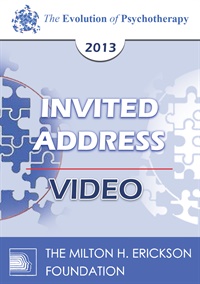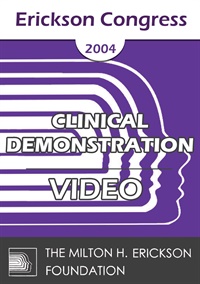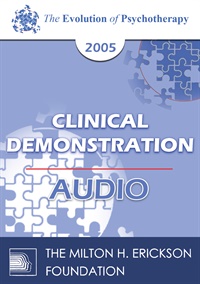
- Average Rating:
- Not yet rated
- Topic Areas:
- Clinical Demonstrations | Dreamwork | Conflict | Psychotherapy | Therapist Development
- Categories:
- Evolution of Psychotherapy | Evolution of Psychotherapy 2005
- Faculty:
- John Gottman, PhD | Julie Gottman, PhD
- Duration:
- 58 Minutes
- Format:
- Audio Only
- Original Program Date:
- Dec 10, 2005
- Short Description:
- Educational Objectives: To list the characteristics of gridlock on perpetual issues. To list the characteristics of dialogue on perpetual issues.
- Price:
- $15.00 - Base Price
- Average Rating:
- Not yet rated
- Topic Areas:
- Workshops | Marriage | Conflict | Couples Therapy | Gottman Method | Psychotherapy
- Categories:
- Evolution of Psychotherapy | Evolution of Psychotherapy 2005
- Faculty:
- John Gottman, PhD | Julie Gottman, PhD
- Course Levels:
- Master Degree or Higher in Health-Related Field
- Duration:
- 2:42:40
- Format:
- Audio and Video
- Original Program Date:
- Dec 08, 2005
- Short Description:
- Scientific research on marriage will be reviewed to answer two questions: What is dysfunctional when a marriage is failing, and what is functional when a marriage is working well? Myths and misconceptions about these questions will be discussed. Research findings will be reviewed to derive two checklists. Although checklists are helpful, they are not fully adequate. To assess a marriage and to intervene we need theory, which will be delineated.
- Price:
-
Sale is $29.00
price reduced from Base Price - $59.00
- Average Rating:
- Not yet rated
- Topic Areas:
- Couples Therapy | Invited Addresses | Communication | Conflict | Psychotherapy
- Categories:
- Evolution of Psychotherapy | Evolution of Psychotherapy 2013
- Faculty:
- Harville Hendrix, PhD
- Course Levels:
- Master Degree or Higher in Health-Related Field
- Duration:
- 58:14
- Format:
- Audio and Video
- Original Program Date:
- Dec 15, 2013
- Short Description:
- In the old way of thinking, stressed couples were depicted as a failed communication system of interacting pathologies that could be improved by therapists dispensing conflict resolution skills. In the new way of thinking, couples are the source of mutual healing and the fulcrum for social transformation. This lecture will discuss how that shift occurred and its implications, not only for the happiness of couples, but for the relational well-being of society.
- Price:
-
Sale is $29.00
price reduced from Base Price - $59.00
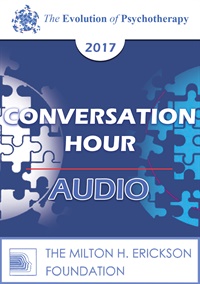
- Average Rating:
- Not yet rated
- Topic Areas:
- Conversation Hours | Couples Therapy | Conflict | Existential Therapy | Psychotherapy | Relationships | Intimacy
- Bundle(s):
- EP17 Audio Streaming Build a Bundle
- Categories:
- Evolution of Psychotherapy | Evolution of Psychotherapy 2017
- Faculty:
- John Gottman, PhD | Julie Gottman, PhD
- Course Levels:
- Master Degree or Higher in Health-Related Field
- Duration:
- 1:03:04
- Format:
- Audio Only
- Original Program Date:
- Dec 15, 2017
- Short Description:
- EP17 Conversation Hour 05 - John Gottman, PhD and Julie Gottman, PhD Educational Objectives: Describe why not all relationship conflict is the same, and why some conflicts require the therapist to be an existential psychologist. Describe why it is so vital for therapists to measure physiology in couples’ therapy. Describe what Gottman sound relationship house theory and Gottman method couples therapy offers in the following domains: (1) friendship and intimacy, (2) conflict management, (3) shared meaning, (4) trust, and (5) commitment.
- Price:
- $15.00 - Base Price
Credit available - Click Here for more information
- Average Rating:
- Not yet rated
- Topic Areas:
- Great Debates | Couples Therapy | Psychoanalysis | Conflict | Psychotherapy | Sex and Sexuality | Relationships
- Bundle(s):
- Learning Track - EP17 Psychoanalysis Stream | EP17 Video Stream Build a Bundle
- Categories:
- Evolution of Psychotherapy | Evolution of Psychotherapy 2017 | Evolution of Psychotherapy Psychoanalysis Learning Track | Online Continuing Education
- Faculty:
- Otto Kernberg, MD | Harville Hendrix, PhD | Helen LaKelly Hunt, PhD
- Course Levels:
- Master Degree or Higher in Health-Related Field
- Duration:
- 1:26:26
- Format:
- Audio and Video
- Original Program Date:
- Dec 14, 2017
- Short Description:
- This presentation will propose a diagnostic assessment of the couple, specifying their conflicts at the level of their sexual life, their integration of expectations regarding daily living together, and potential discrepancies regarding their value systems, including their overall social integration. On this basis, a diagnostic assessment of unconscious reactivation in both partners of unresolved conflicts in their relation with their parental couples may determine the strategy of therapeutic interventions.
- Price:
-
Sale is $29.00
price reduced from Base Price - $59.00
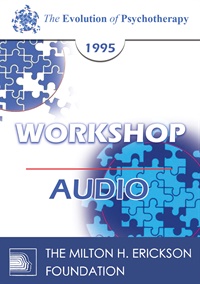
- Average Rating:
- Not yet rated
- Topic Areas:
- Workshops | Cognitive Behavior Therapy (CBT) | Conflict | Couples Therapy | Psychotherapy
- Categories:
- Evolution of Psychotherapy | Evolution of Psychotherapy 1995
- Faculty:
- Aaron Beck, MD | Judith Beck, PhD
- Duration:
- 2 Hours 34 Minutes
- Format:
- Audio Only
- Original Program Date:
- Dec 17, 1995
- Short Description:
- Strategies developed in cognitive therapy of depression are readily applied to couples' problems. Assessment of conflicting perspectives, thinking disorder, escalation of distortions and cognitive interference with communication. Reducing hostility, reinforcing pleasure, increasing collaboration and improving sexual satisfaction through cognitive interventions.
- Price:
- $15.00 - Base Price
- Average Rating:
- Not yet rated
- Topic Areas:
- Clinical Demonstrations | Conflict | Belief Systems
- Categories:
- Erickson Congress | Erickson Congress 2004
- Faculty:
- Robert Dilts, BA
- Course Levels:
- Master Degree or Higher in Health-Related Field
- Duration:
- 1:07:50
- Format:
- Audio and Video
- Original Program Date:
- Dec 03, 2004
- Short Description:
- To describe how to identify and sort beliefs at the root of inner conflict. To describe a method for reframing conflicting beliefs in order to bring about new possibilities for resolution.
- Price:
-
Sale is $29.00
price reduced from Base Price - $59.00
Tags: Belief Systems Conflict
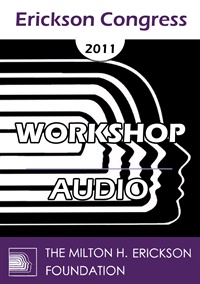
- Average Rating:
- Not yet rated
- Topic Areas:
- Couples Therapy | Hypnosis | Workshops | Affect | Conflict | Intimacy | Relationships
- Categories:
- Erickson Congress | Erickson Congress 2011
- Faculty:
- Carolyn Daitch, PhD
- Duration:
- 1 hour
- Format:
- Audio Only
- Original Program Date:
- Dec 07, 2011
- Short Description:
- This course will present concrete tools and methods of hypnosis to help couples end their habitual conflict escalation. Participants will learn the impact of affect dysregulation on relationships, client-friendly tools to enhance intimacy and connection, and how to rehearse and transfer skills from therapy to real life
- Price:
- $20.00 - Base Price
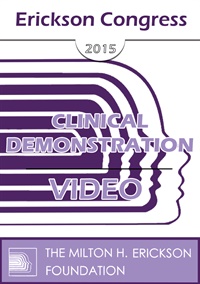
- Average Rating:
- Not yet rated
- Topic Areas:
- Clinical Demonstrations | Mindfulness | Buddhism | Conflict
- Categories:
- Erickson Congress | Erickson Congress 2015
- Faculty:
- Robert Dilts, BA
- Course Levels:
- Master Degree or Higher in Health-Related Field
- Duration:
- 01:00:00
- Format:
- Audio and Video
- Original Program Date:
- Dec 11, 2015
- Short Description:
- Conflicts of identity most often show up in the form of a struggle between our idealized self (ego) and the shadow it necessarily creates. This struggle shows up as an inner conflict or dilemma of some sort. This demonstration will show how to go beyond conflicts created by bipolar thinking using the Buddhist mindfulness process of the "tetra lemma."
- Price:
-
Sale is $29.00
price reduced from Base Price - $59.00
Tags: Buddhism Conflict Mindfulness
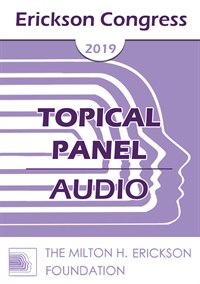
- Average Rating:
- Not yet rated
- Topic Areas:
- Workshops | Binds | Conflict | Therapist Development
- Categories:
- Erickson Congress | Erickson Congress 2019
- Faculty:
- Robert Dilts, BA
- Duration:
- 1 Hour 59 Minutes
- Format:
- Audio Only
- Original Program Date:
- Dec 12, 2019
- Short Description:
- A “double bind” is a special type of conflict which creates a “no-win” situation; i.e., a situation in which one is “damned if you do, and damned if you don’t.” According to anthropologist Gregory Bateson, who originally defined the notion of the double bind, such conflicts are at the root of both creativity and psychosis. The difference is whether or not one is able to identify and transcend the bind in an appropriate way. This workshop will cover some of the key skills necessary to identify the underlying conditions which create conflicts double binds, and thus to resolve them.
- Price:
- $15.00 - Base Price
Please wait ...



